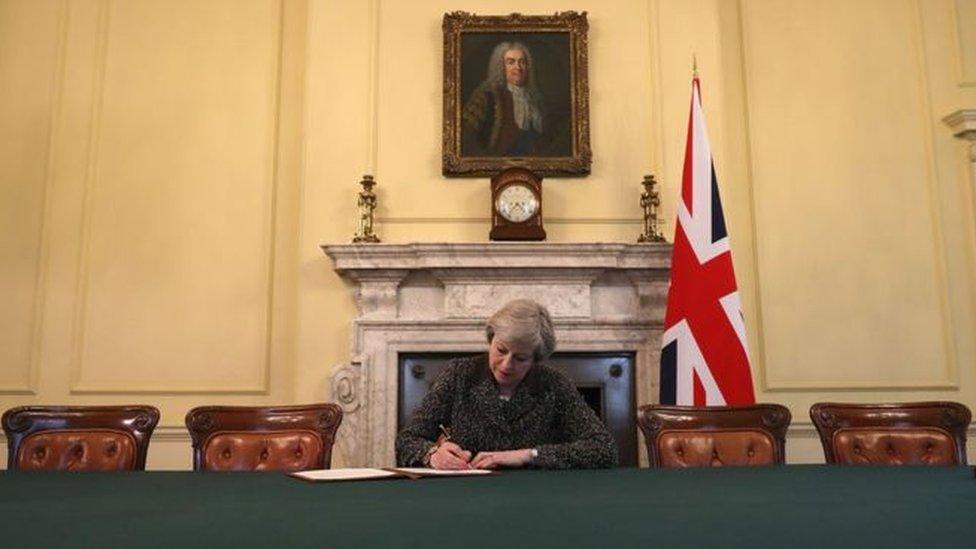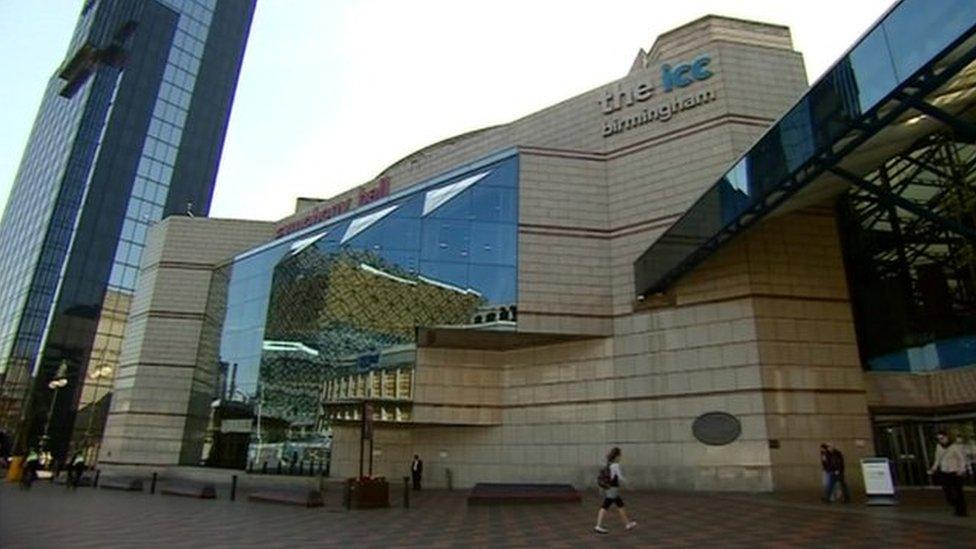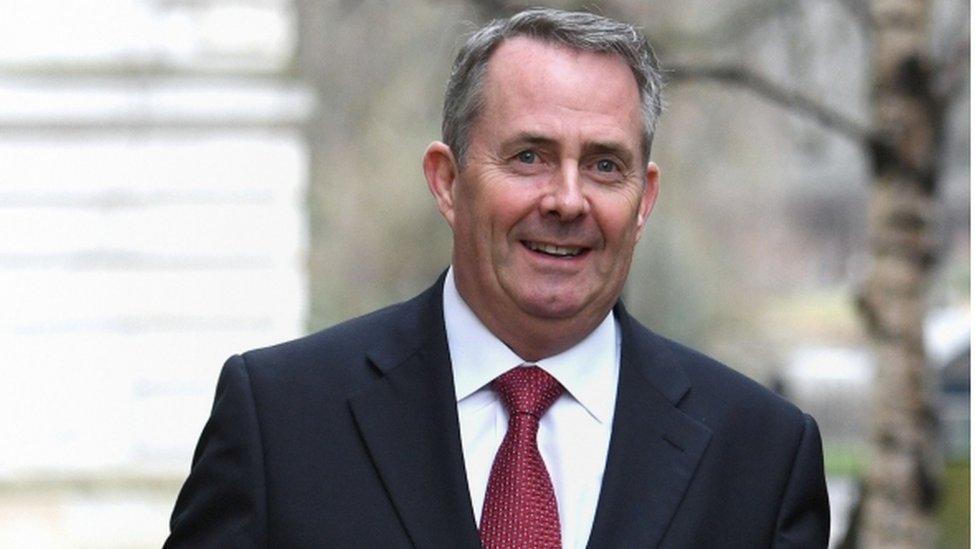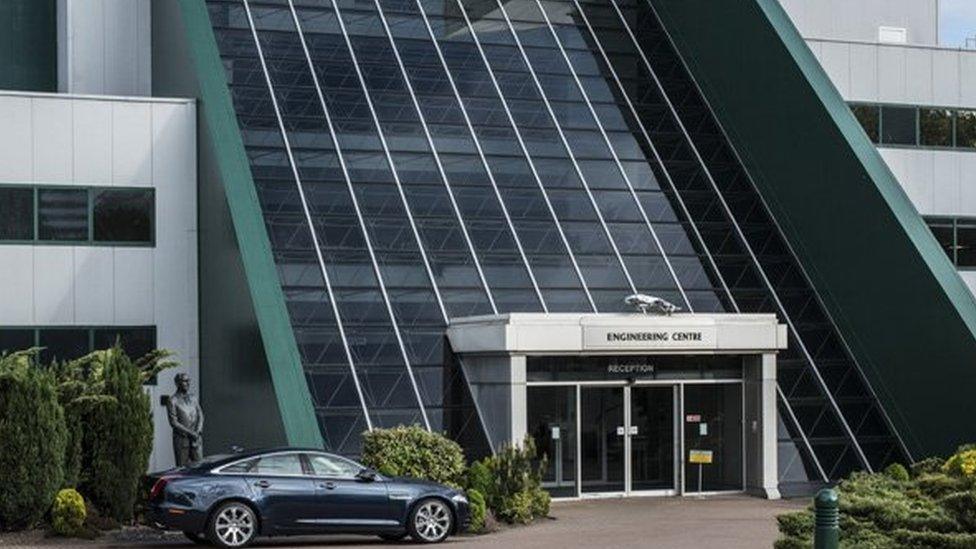Theresa May Triggers An Indefinite Article
- Published

Theresa May signs the letter which will trigger Article 50, confirming the UK's departure from the EU.
Long, long ago in those distant days when I was an undergraduate student of politics, I read a seminal account of Britain's relationship with post-war Europe by the British economist Andrew Shonfield.
"Europe: Journey to An Unknown Destination" was first published in 1972, just one year before the UK joined what was then the Common Market. Shonfield set out why "The Six", as they were known, the founder nations, had embarked on what was to become known as "the European project", and attempted to explore the uncertainties of the journey that lay ahead.
My tutor put it quite straightforwardly: "It's one thing for six people to decide to get on a bus. Another altogether for them the agree how many more should get on, how fast it should travel, to what destination and when, if ever, any of them should get off".
I have often thought back to that conversation, but never more so than at this "pivotal moment" when Theresa May triggers Article 50 of the Lisbon Treaty to set Britain on course to leave what is now the European Union of 28 nations in two years' time.
"A momentous journey," is how she describes it. Naturally, I am reminded of that earlier journey, albeit in the exact opposite direction. But now, as then, the ultimate destination is spectacularly "Unknown".
Join the dots
By a neat accident of timing, I spent the day before Article 50 was triggered in the company of business, academic and local authority leaders at the International Convention Centre in Birmingham, the venue for the biggest-ever business forum staged jointly by the governments of Britain and Qatar.

There's been a promise of up to £5bn investment in the Midlands infrastructure from the Qatari government
It was a measure of how much store Mrs May set by the promise of up to £5bn of Qatari investment in Midlands transport infrastructure, education, healthcare, sport, and cyber security projects that she found time even as she prepared to sign that letter to Donald Tusk, to come to the ICC to deliver the keynote speech.
Whether these two separate, but by no means unrelated, events really were a matter of sheer coincidence, there was no disguising the positive gloss being put on things by another of the VIP speakers, Dr Liam Fox, the International Trade Secretary; famously, one of the three Brexiteers whom Mrs May brought into the Cabinet to help deal with the new reality for which they had so energetically campaigned.
He told me the promised investment was "a vote of confidence that the Midlands Engine is firing up for business". He presented post-Brexit Britain as a land of opportunity and commended "Birmingham, our Second City" as "the right and proper beneficiary" of this major investment.
Business Questions
But do those business leaders themselves share Dr Fox's determinedly optimistic outlook? According to the old adage "business hates uncertainty" and Brexit delivers that in spades.
My own random sample of opinions ranged between those who had morphed from Remainers to Brexiteers in the nine months since the vote, as the predicted economic catastrophe had conspicuously failed to materialise; to those who, more stoically, "were fearing the worst but hoping for the best".

International Trade Secretary Dr Liam Fox says the Qatari investment is a sign the Midlands Engine is firing up for business
Whenever Mrs May sets out her vision of a global Britain, she is apt to point out that ours is the only region running a trade surplus with China.
This is thanks very largely to the worldwide success story of Jaguar Land Rover. They design their cars in Coventry, make the engines in Wolverhampton and build them in Birmingham and Solihull and offer a growing range of opportunities for smaller local firms in the supply chain. Surprise surprise, our region's car industry is enjoying a new golden age.
But, (and it is a Big But), JLR's German boss, Dr Ralf Speth, has told the BBC how worried he is about the prospect of losing "open access" to what are still his firm's biggest markets in Europe. "Access" is the key word here. Now that Mrs May has ruled out our continued membership of the EU Single Market, much of the forthcoming negotiation will focus on exactly what form our "access" to it might take.
And if the fears of Dr Speth weigh heavily on the Prime Minister's mind, so too will the complications of deal-making on several fronts at the same time.
She has to contend not only with her counterparts in Europe, but also with the various sections of her party at home. Our part of the country is home to a concentration of Tory backbenchers who campaigned for a Leave vote: Bill Cash and Owen Paterson are unlikely to be backward in coming forward. But neither are the so-called "Tory Remoaners" who are already threatening to go nuclear and vote against the Great Repeal Bill if they are not convinced the government is negotiating what they see as a good deal.
Digby and Rigby
All of which sets the stage wonderfully for what I predict will be a defining edition of Sunday Politics Midlands this weekend.

JLR's site in Whitley, Coventry, the firm's global HQ, has been earmarked for further investment. But it's German boss, Dr Ralf Speth, has told the BBC how worried he is about the prospect of losing "open access" to what are still his firm's biggest markets in Europe.
We will be hearing from two of the heaviest-hitters on the business scene in our part of the country: former Trade Minister, Digby Lord Jones of Birmingham, who campaigned for a Leave vote in typically outspoken style. And Sir Peter Rigby, whose business empire includes technology, aviation, property and financial services. He sees Brexit as a disaster for Britain and is convinced that two years will be nowhere near enough time for an exit strategy to be negotiated.
Also joining me in the studio will be the Conservative MP for Aldridge-Brownhills, Wendy Morton and the Labour MP for Birmingham Erdington, Jack Dromey.
And I hope you will join us too, in our usual 11.00 slot on BBC One Midlands this Sunday 2 April 2017.